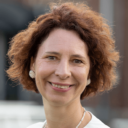I still hear in conversations that philanthropy plays an important role as the grease that lubricates the wheels of society. During the Philea Forum this week, I was encouraged to see that many foundations can and want to do more. This has never been more important. The challenges facing our society and planet mean we must collaborate in ways we’ve never done before.
Although the cracks were apparent before the covid-19 pandemic and the Russian invasion of Ukraine, it’s clearer than ever that our societies and systems risk a total or partial collapse. Our fossil fuel dependency is fuelling the conflict. Increased energy prices are hitting people living in poverty the hardest. And climate change is impacting people and communities in some of the most vulnerable parts of the world.
At the same time, the 13.5 million people[1] displaced by the war in Ukraine are sadly part of a much bigger reality. According to UNHCR, the UN Refugee Agency, the number of forcibly displaced people worldwide has exceeded 100 million. The war has also revealed the fragility of our food systems, with 250 million people on the brink of famine.
One of the IKEA Foundation’s key values is togetherness. This was beautifully demonstrated at the opening dinner where traditional Catalan Castellers built a human tower. It’s a feat that is made possible because everyone contributes and works together. This is symbolic of the role of philanthropy. By working together, we can and must be a catalyst for the changes we want to see. For this we need a strong voice. In May this year, I was honoured to represent the IKEA Foundation at the statutory founding of Philea, bringing European philanthropy together under one organisation. This couldn’t be timelier.
The Philea Forum in Barcelona has given me many reasons for hope. First, because the discussions and examples show a readiness by philanthropy to step up and support governments in a complementary way. Foundations can develop solutions, take risks and create opportunities for the many to express their voice. They have a deep understanding of the interconnectedness of today’s challenges
Secondly, foundations are agile and can step up in times of acute crises. I was deeply touched by the conversation with Eugenia Mazurenko and Inna Pidluska about how philanthropy is responding in Ukraine. They not only represented Ukrainian civil society but also strong resilience.
Thirdly, the breakout sessions showed how philanthropy can enable new insights by bringing together artists and scientists. At a session hosted by the Open Society Foundation, artist Joana Moll showed how data taken from us on the internet to serve certain business models creates huge climate impacts. Solutions need to be embedded in a new way of thinking around the futures we envisage.
Finally, it was heartening to hear Miia Rossi-Gray from the European Commission explicitly recognise the role of philanthropy in tackling the systemic challenges Europe and the world are facing.
The process leading to the creation of Philea has been exemplary in terms of transparency, inclusiveness, and willingness to listen. This constitutes a strong basis for collaboration. That’s why I wholeheartedly support Philea’s campaign #WhenWeUnite.
While I’m writing this blog, the song ‘Beds are burning’ by the Australian group Midnight Oil is playing in my head. It’s a song about justice for the Australian aboriginals but the theme feels universal and timeless.
‘How do we sleep while our beds are burning?’ These words symbolise the pressures on our systems. Philanthropy can and must play its role to make sure that it drives systemic change.
Truus Huisman is Chief Communications Officer at IKEA Foundation



Comments (3)
soon and very soon, the Russian war in Ukraine will bite. We in Africa will surely feel the impact of the war because very soon our supply of bread, wheat, cooking oil and other commodities we get from Ukraine starts to dry out.
Help with Assignment is a UK based academic portal which is committed to ensuring your academic success. with Assignment offers free unlimited revisions if in case you are not satisfied with the quality of your papers. With the best online assistance, Help with Assignment always focus on producing best quality assignments on the bedrock of extensive research.
What I've realized is that a lovely and well-appointed home ought to be within the financial reach of as many people as feasible. We consistently set ourselves and others the task of producing more with fewer resources while maintaining a high level of quality.
Great piece. It was nice meeting you at the PHILEA conference. Indeed IKEA is already working with Practical Action for a programme that is transforming the lives of refugees in Rwanda. AS Ruus mentioned, there is more scope for philanthropy to do more. For example, soon and very soon, the Russian war in Ukraine will bite. We in Africa will surely feel the impact of the war because very soon our supply of bread, wheat, cooking oil and other commodities we get from Ukraine starts to dry out. In the past few years, Practical Action and IKEA were working in Rwanda to improve conditions for refugees communities in that country. A much bigger challenge is on the horizon. How can African countries absorb the shock and mitigate the impact of artificial / acute food shortage that will emerge from Russian blockage of grain export from Ukraine that I see on my TV? How can development agencies and Philanthropies work hand in hand ahead of time to boost local production of grains to absorb the shock that we know is coming. Thanks to great foundations like IKEA. We need you. Africa needs you.